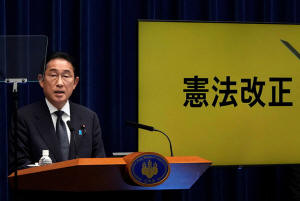Japan must strengthen NATO ties to safeguard global peace, PM says
 Send a link to a friend
Send a link to a friend
 [July 09, 2024]
By Yukiko Toyoda and John Geddie [July 09, 2024]
By Yukiko Toyoda and John Geddie
TOKYO (Reuters) - Russia's deepening military cooperation with North
Korea has underlined the need for Japan to forge closer ties with NATO
as regional security threats become increasingly intertwined, Prime
Minister Fumio Kishida told Reuters.
In written remarks ahead of his attendance at a NATO summit in
Washington DC this week, Kishida also signaled concern over Beijing's
alleged role in aiding Moscow's two-year-old war in Ukraine, although he
did not name China.
"The securities of the Euro-Atlantic and the Indo-Pacific are
inseparable, and Russia’s aggression against Ukraine and its deepened
military cooperation with North Korea are strong reminders of that,"
Kishida said.
"Japan is determined to strengthen its cooperation with NATO and its
partners," he added.
The world, the Japanese leader said, should not tolerate attempts by
some countries to disrupt the established international order and
reiterated a warning that Ukraine today could be East Asia tomorrow. He
also urged cooperation to confront new security threats that transcend
geographical boundaries, such as cyber-attacks and conflicts in space.

South Korea, Australia and New Zealand, which along with Japan are known
as the Indo-Pacific Four (IP4), are also attending the July 10-11
meeting with NATO leaders.
South Korean President Yoon Suk Yeol told Reuters this week that he
planned to discuss the threat Pyongyang poses to Europe by deepening its
Russia ties.
North Korean leader Kim Jong-Un signed a mutual defense pledge with
Russia last month during President Valdimir Putin's first visit to
Pyongyang in 24 years, and expressed his "full support" for Russia's war
in Ukraine.
The U.S. and its allies have accused Pyongyang of providing ballistic
missiles and artillery shells that Russia has used in its war in Ukraine
and say they fear Moscow in return could provide support for North
Korea's nuclear missile development.
Washington has also said China is supplying drone and missile
technology, satellite imagery and machine tools to Russia, items which
fall short of lethal assistance but are helping Moscow build its
military to sustain the Ukraine war. Beijing has said it has not
provided any weaponry to any party.
[to top of second column]
|

Japan's Prime Minister Fumio Kishida speaks during a press
conference at the prime minister's office in Tokyo, Japan, June 21,
2024. FRANCK ROBICHON/Pool via REUTERS/File Photo

Without naming China, Kishida told Reuters "some countries" have
allegedly transferred dual-use civilian-military goods to Russia
which has served "as a lifeline" for its Ukraine war.
"It is necessary to grapple with such situations in a multi-faceted
and strategic manner, taking a panoramic view that considers the
full range of international actors fuelling Russia’s attempt to
change the status quo by force," he said.
"The geographical boundary of 'Euro-Atlantic' or 'Indo-Pacific' is
no longer relevant in safeguarding global peace and security. Japan
and Indo-Pacific partners can play a great role for NATO allies from
this perspective."
Constrained by decades of pacifism, Tokyo has been reluctant to
supply lethal aid to Ukraine.
It has, however, provided financial aid to Kyiv, spearheaded efforts
to prepare for its post-war reconstruction, and contributed to
NATO’s fund to provide Ukraine with non-lethal equipment such as
anti-drone detection systems.
Tokyo has also repeatedly warned about the risks of a similar
conflict emerging in East Asia, where China has been taking an
increasingly muscular stance towards its territorial claims
including the democratic island of Taiwan.
"This summit is a critical opportunity for Japan, the U.S., and the
other NATO allies to confront the ongoing challenges against the
international order and to reaffirm values and principles that have
shaped global peace and prosperity," he said.
There may be limits, however, over how far NATO members are prepared
to go in forging closer ties in Asia. A plan that surfaced last year
for NATO to open a liaison office in Japan, its first in Asia, was
blocked by France and criticised by China.
(Reporting by Yukiko Toyoda and John Geddie; Editing by Michael
Perry)
[© 2024 Thomson Reuters. All rights reserved.]This material
may not be published, broadcast, rewritten or redistributed.
Thompson Reuters is solely responsible for this content.
 |